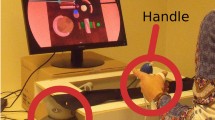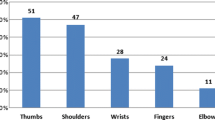Abstract
The outcome of arthroscopic procedures is related to the surgeon’s skills in arthroscopy. Currently, evaluation of such skills relies on direct observation by a surgeon trainer. This type of assessment, by its nature, is subjective and time-consuming. The aim of our study was to identify whether haptic information generated from arthroscopic tools could distinguish between skilled and less skilled surgeons. A standard arthroscopic probe was fitted with a force/torque sensor. The probe was used by five surgeons with different levels of experience in knee arthroscopy performing 11 different tasks in 10 standard knee arthroscopies. The force/torque data from the hand and tool interface were recorded and synchronized with a video recording of the procedure. The torque magnitude and patterns generated were analyzed and compared. A computerized system was used to analyze the force/torque signature based on general principles for quality of performance using such measures as economy in movement, time efficiency, and consistency in performance. The results showed a considerable correlation between three haptic parameters and the surgeon’s experience, which could be used in an automated objective assessment system for arthroscopic surgery.
Level of Evidence: Level II, diagnostic study. See the Guidelines for Authors for a complete description of levels of evidence.



Similar content being viewed by others
References
Bliss JP, Hanner-Bailey HS, Scerbo MW. Determining the efficacy of an immersive trainer for arthroscopy skills. Stud Health Technol Inform. 2005;111:54–56.
Chami G, Ward J, Wills D, Phillips R, Sherman K. Smart tool for force measurements during knee arthroscopy: in vivo human study. Stud Health Technol Inform. 2006;119:85–89.
Dosis A, Bello F, Gillies D, Undre S, Aggarwal R, Darzi A. Laparoscopic task recognition using Hidden Markov Models. Stud Health Technol Inform. 2005;111:115–122.
McCarthy A, Harley P, Smallwood R. Virtual arthroscopy training: do the “virtual skills” developed match the real skills required? Stud Health Technol Inform. 1999;62:221–227.
Miller WE. Learning arthroscopy. South Med J. 1985;78:935–937.
Rosen J, Hannaford B, Richards CG, Sinanan MN. Markov modeling of minimally invasive surgery based on tool/tissue interaction and force/torque signatures for evaluating surgical skills. IEEE Trans Biomed Eng. 2001;48:579–591.
Rosen J, Solazzo M, Hannaford B, Sinanan M. Objective laparoscopic skills assessments of surgical residents using Hidden Markov Models based on haptic information and tool/tissue interactions. Stud Health Technol Inform. 2001;81:417–423.
Rosen J, Solazzo M, Hannaford B, Sinanan M. Task decomposition of laparoscopic surgery for objective evaluation of surgical residents’ learning curve using hidden Markov model. Comput Aided Surg. 2002;7:49–61.
Sherman KP, Ward JW, Wills DP, Mohsen AM. A portable virtual environment knee arthroscopy training system with objective scoring. Stud Health Technol Inform. 1999;62:335–336.
Sherman KP, Ward JW, Wills DP, Sherman VJ, Mohsen AM. Surgical trainee assessment using a VE knee arthroscopy training system (VE-KATS): experimental results. Stud Health Technol Inform. 2001;81:465–470.
Acknowledgments
We thank the Department of Computer Science at Hull University and the operating room staff at Castle Hill Hospital in facilitating the study. We thank all who participated in the study and data collection.
Author information
Authors and Affiliations
Corresponding author
Additional information
Each author certifies that he has no commercial associations (eg, consultancies, stock ownership, equity interest, patent/licensing arrangements, etc) that might pose a conflict of interest in connection with the submitted article.
Each author certifies that his institution has approved the human protocol for this investigation, that all investigations were conducted in conformity with ethical principles of research, and that informed consent was obtained.
About this article
Cite this article
Chami, G., Ward, J.W., Phillips, R. et al. Haptic Feedback Can Provide an Objective Assessment of Arthroscopic Skills. Clin Orthop Relat Res 466, 963–968 (2008). https://doi.org/10.1007/s11999-008-0115-9
Received:
Accepted:
Published:
Issue Date:
DOI: https://doi.org/10.1007/s11999-008-0115-9




